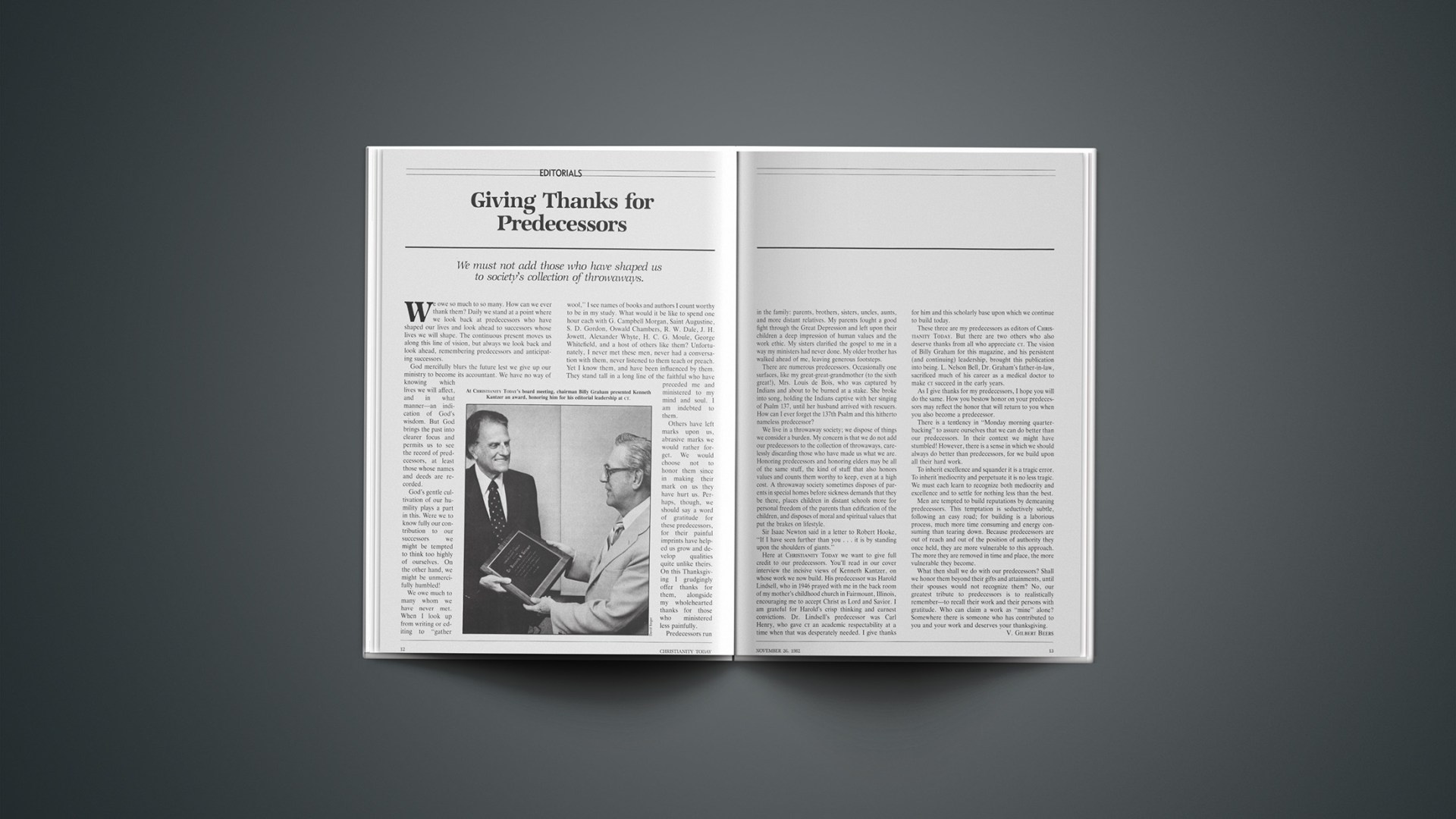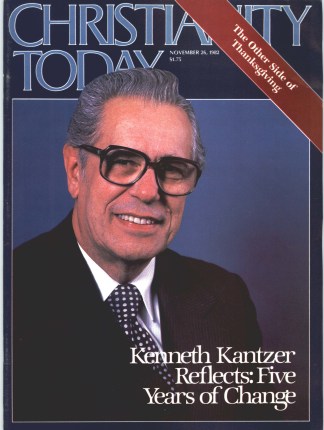We owe so much to so many. How can we ever thank them? Daily we stand at a point where we look back at predecessors who have shaped our lives and look ahead to successors whose lives we will shape. The continuous present moves us along this line of vision, but always we look back and look ahead, remembering predecessors and anticipating successors.
God mercifully blurs the future lest we give up our ministry to become its accountant. We have no way of knowing which lives we will affect, and in what manner—an indication of God’s wisdom. But God brings the past into clearer focus and permits us to see the record of predecessors, at least those whose names and deeds are recorded.
God’s gentle cultivation of our humility plays a part in this. Were we to know fully our contribution to our successors we might be tempted to think too highly of ourselves. On the other hand, we might be unmercifully humbled!
We owe much to many whom we have never met. When I look up from writing or editing to “gather wool,” I see names of books and authors I count worthy to be in my study. What would it be like to spend one hour each with G. Campbell Morgan, Saint Augustine, S. D. Gordon, Oswald Chambers, R. W. Dale, J. H. Jowett, Alexander Whyte, H. C. G. Moule, George Whitefield, and a host of others like them? Unfortunately, I never met these men, never had a conversation with them, never listened to them teach or preach. Yet I know them, and have been influenced by them. They stand tall in a long line of the faithful who have preceded me and ministered to my mind and soul. I am indebted to them.
Others have left marks upon us, abrasive marks we would rather forget. We would choose not to honor them since in making their mark on us they have hurt us. Perhaps, though, we should say a word of gratitude for these predecessors, for their painful imprints have helped us grow and develop qualities quite unlike theirs. On this Thanksgiving I grudgingly offer thanks for them, alongside my wholehearted thanks for those who ministered less painfully.
Predecessors run in the family: parents, brothers, sisters, uncles, aunts, and more distant relatives. My parents fought a good fight through the Great Depression and left upon their children a deep impression of human values and the work ethic. My sisters clarified the gospel to me in a way my ministers had never done. My older brother has walked ahead of me, leaving generous footsteps.
There are numerous predecessors. Occasionally one surfaces, like my great-great-grandmother (to the sixth great!), Mrs. Louis de Bois, who was captured by Indians and about to be burned at a stake. She broke into song, holding the Indians captive with her singing of Psalm 137, until her husband arrived with rescuers. How can I ever forget the 137th Psalm and this hitherto nameless predecessor?
We live in a throwaway society; we dispose of things we consider a burden. My concern is that we do not add our predecessors to the collection of throwaways, carelessly discarding those who have made us what we are. Honoring predecessors and honoring elders may be all of the same stuff, the kind of stuff that also honors values and counts them worthy to keep, even at a high cost. A throwaway society sometimes disposes of parents in special homes before sickness demands that they be there, places children in distant schools more for personal freedom of the parents than edification of the children, and disposes of moral and spiritual values that put the brakes on lifestyle.
Sir Isaac Newton said in a letter to Robert Hooke, “If I have seen further than you … it is by standing upon the shoulders of giants.”
Here at CHRISTIANITY TODAY we want to give full credit to our predecessors. You’ll read in our cover interview the incisive views of Kenneth Kantzer, on whose work we now build. His predecessor was Harold Lindsell, who in 1946 prayed with me in the back room of my mother’s childhood church in Fairmount, Illinois, encouraging me to accept Christ as Lord and Savior. I am grateful for Harold’s crisp thinking and earnest convictions. Dr. Lindsell’s predecessor was Carl Henry, who gave CT an academic respectability at a time when that was desperately needed. I give thanks for him and this scholarly base upon which we continue to build today.
These three are my predecessors as editors of CHRISTIANITY TODAY. But there are two others who also deserve thanks from all who appreciate CT. The vision of Billy Graham for this magazine, and his persistent (and continuing) leadership, brought this publication into being. L. Nelson Bell, Dr. Graham’s father-in-law, sacrificed much of his career as a medical doctor to make CT succeed in the early years.
As I give thanks for my predecessors, I hope you will do the same. How you bestow honor on your predecessors may reflect the honor that will return to you when you also become a predecessor.
There is a tendency in “Monday morning quarter-backing” to assure ourselves that we can do better than our predecessors. In their context we might have stumbled! However, there is a sense in which we should always do better than predecessors, for we build upon all their hard work.
To inherit excellence and squander it is a tragic error. To inherit mediocrity and perpetuate it is no less tragic. We must each learn to recognize both mediocrity and excellence and to settle for nothing less than the best.
Men are tempted to build reputations by demeaning predecessors. This temptation is seductively subtle, following an easy road; for building is a laborious process, much more time consuming and energy consuming than tearing down. Because predecessors are out of reach and out of the position of authority they once held, they are more vulnerable to this approach. The more they are removed in time and place, the more vulnerable they become.
What then shall we do with our predecessors? Shall we honor them beyond their gifts and attainments, until their spouses would not recognize them? No, our greatest tribute to predecessors is to realistically remember—to recall their work and their persons with gratitude. Who can claim a work as “mine” alone? Somewhere there is someone who has contributed to you and your work and deserves your thanksgiving.
V. GILBERT BEERS










